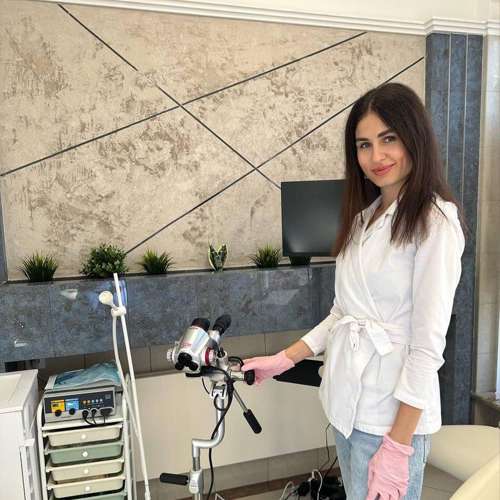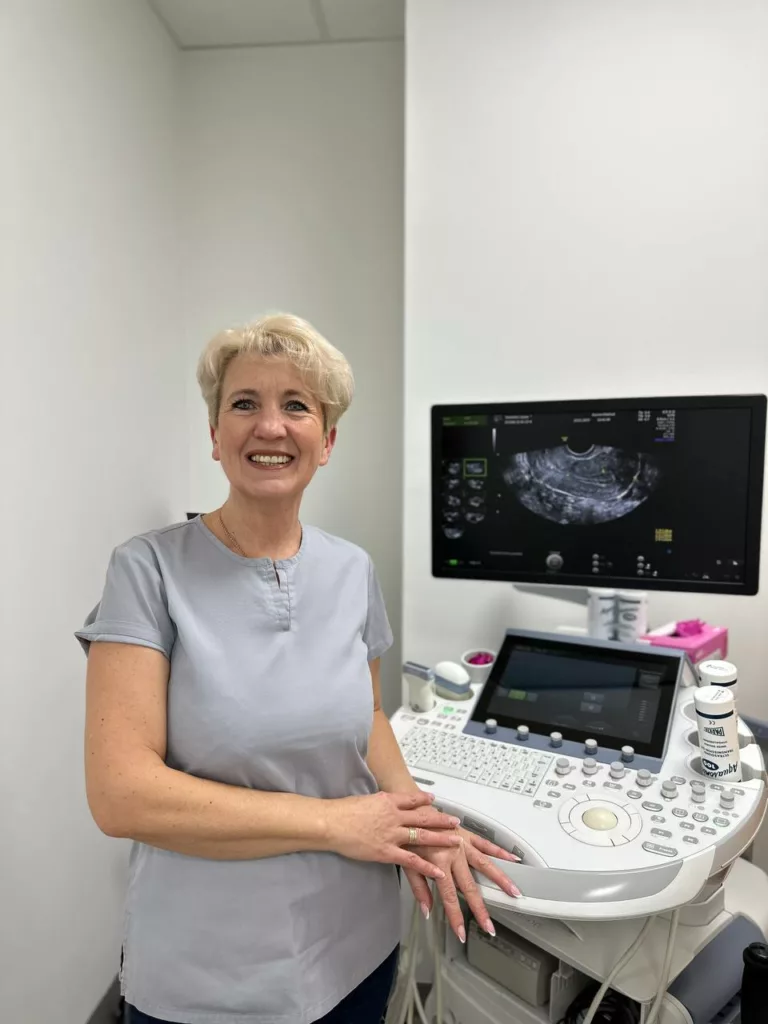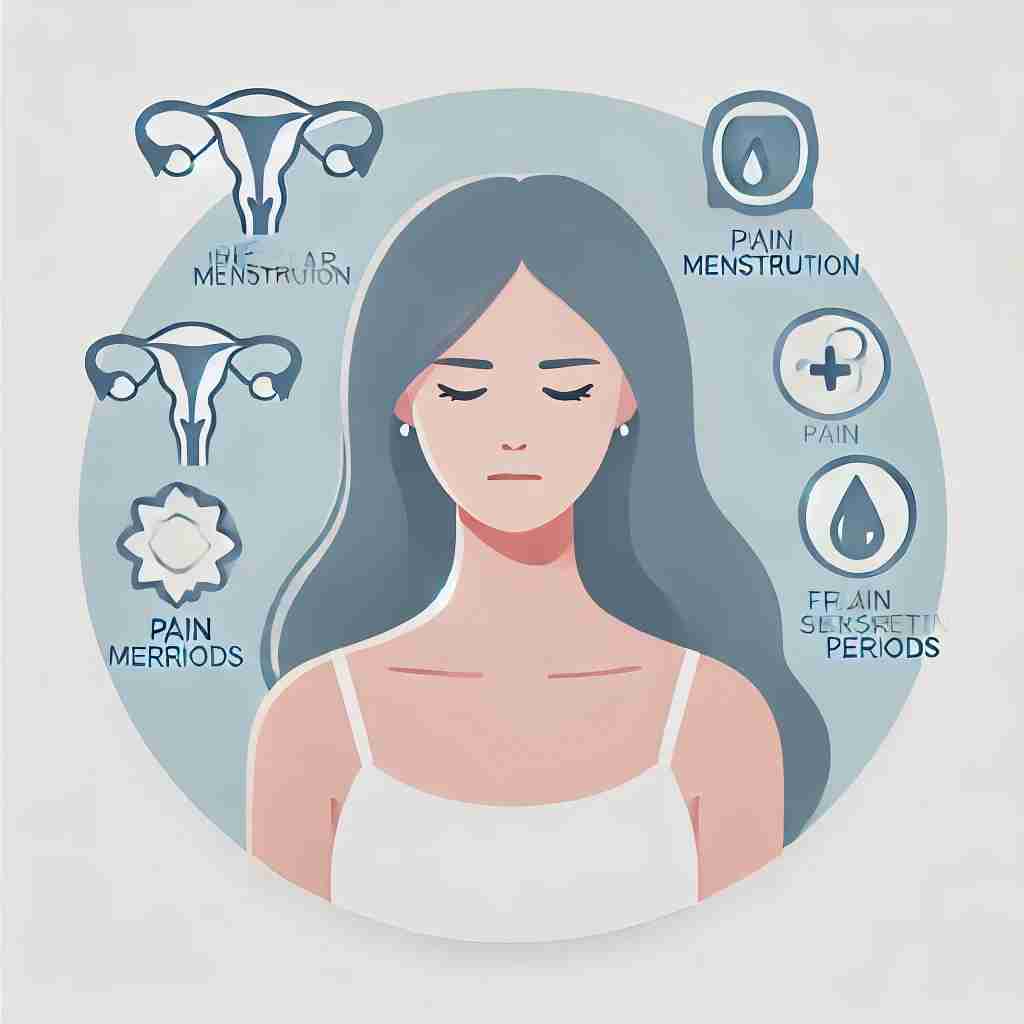Gynecologist in Warsaw
Consultation with a Gynecologist at Aurora Medical Clinic or Online
Aurora Medical – a modern gynecology clinic in Warsaw, where professionalism meets genuine care for women’s health. Our team of doctors follows the principles of evidence-based medicine and an individual approach, creating a comfortable and trustworthy atmosphere for every patient.
We offer a wide range of gynecological services, including preventive check-ups, diagnostics, treatment, pregnancy care, and counseling on women’s health issues.
Our Doctors ⬇️

Anastasiia Sergiienko – Ukrainian Gynecologist in Warsaw
About the Doctor
Anastasiia Sergiienko is a Ukrainian gynecologist practicing in Warsaw. Her approach is grounded in evidence-based medicine and a careful, attentive attitude toward women’s health. She avoids prescribing unnecessary medications and does not use aggressive treatment methods. Anastasiia always explains to her patients what is happening during examinations, informs them about the next steps, and shares insights from ultrasound scans to ensure visits are as comfortable and understandable as possible.
She understands that a gynecological visit can be stressful and takes every measure to minimize discomfort. Over the course of a year, more than 600 patients have left top-rated reviews on Google.
Anastasiia also gained experience working at a gynecological clinic in Canada, while simultaneously attending courses offered by Harvard Medical School, The Society of Canadian Colposcopists, and The Society of Gynaecologists of Canada. This experience allowed her to learn from leading specialists and to provide care with utmost sensitivity and attention, regardless of nationality, race, religion, or gender identity.
In addition to her clinical work, Anastasiia runs a gynecology blog on Instagram and Facebook, where she shares useful and up-to-date information for women of all ages, currently reaching over 34,000 followers.
Services and Languages
Anastasia provides both in-person and online consultations in four languages: Ukrainian, English, Polish, and Russian.
English-speaking gynecologist in Warsaw
My goal is to provide medical assistance where it is genuinely needed. My approach is to be a doctor-partner for YOUR HEALTH

Ms. Ivanna – Obstetrician-Gynecologist
Ms. Ivanna is a Ukrainian obstetrician-gynecologist dedicated to women’s health. In her practice, she combines the principles of evidence-based medicine with an individual approach to each patient.
Her professional experience includes work in maternity wards and departments of pregnancy pathology in Ukraine. Thanks to continuous education and improvement of her medical knowledge, Ms. Ivanna ensures highly professional care for her patients.
At the clinic, she provides a wide range of services such as preventive examinations, diagnosis and treatment of gynecological conditions, women’s health consultations, and pregnancy care.
Every visit combines high-quality medical assistance with the creation of a comfortable and trusting atmosphere between the doctor and the patient.
Appointments are available in Ukrainian and Polish.

Anzhelika Samus – Gynecologist
Anzhelika Samus is a gynecologist with more than 25 years of medical experience, over 5 of which she has been practicing in Warsaw.
She graduated from the Grodno State Medical University in Belarus. In 2020, she successfully nostrified her diploma at the Medical University of Białystok and confirmed her specialization in obstetrics and gynecology in Poland.
Her practice includes gynecological examinations, pregnancy care, diagnosis and treatment of gynecological diseases, ultrasound of the pelvic organs and breasts, and working with patients of all ages, including children and adolescents.
Ms. Anzhelika strives to create an atmosphere of trust and comfort for her patients, adhering to the principles of evidence-based medicine and an individualized approach. She ensures that every patient feels heard, fully understands each stage of the examination, and actively participates in the discussion of her treatment plan.
She regularly enhances her qualifications by participating in professional conferences and training courses.
Consultations are available in four languages: Ukrainian, Belarusian, Polish, and Russian.
What our customers say ❤️
Gynecological Services and Specializations
Women’s health is at the heart of my work. It requires not only medical knowledge, but also empathy, precision, and trust. My goal is to provide the highest standard of gynecological care, helping women feel safe, understood, and supported at every stage of life.
I offer a wide range of services, from preventive check-ups and ultrasound diagnostics to contraception counseling, fertility planning, and pregnancy care. Procedures such as colposcopy, cervical and endometrial biopsy, and intrauterine device insertion or removal are performed with accuracy and care.
Areas of expertise include: menstrual disorders, uterine fibroids, ovarian cysts, polycystic ovary syndrome (PCOS), endometriosis, endometrial hyperplasia, polyps, cervical pathologies, pelvic inflammatory disease, and menopause management.
Each consultation is a balance of evidence-based medicine and an individual approach, ensuring that every patient receives not just treatment, but genuine care and reassurance.
What Symptoms May Indicate the Development of Gynecological Conditions?
The most common symptoms indicating the need for a gynecological consultation include menstrual irregularities (painful, heavy, or unusually light bleeding), lower abdominal pain, abnormal vaginal discharge, changes in the external genitalia, discomfort before or after menstruation (hot flashes, burning sensations, dryness), urinary incontinence during physical activity, and pain or bleeding during sexual intercourse. It is advisable not to delay a visit if conception has not occurred after one year of trying.
Gynecology focuses on the structure, function, and diseases of the female reproductive system. A consultation may be necessary in cases of PCOS, cervical dysplasia, ovarian tumors, inflammations and cysts, endometrial hyperplasia, menopausal symptoms, endometrial polyps, urinary tract disorders, sexual dysfunction, pelvic inflammatory diseases, cervical pathologies, uterine fibroids, menstrual cycle disorders, or endometriosis.
Modern gynecology also encompasses support for sexual and reproductive health, including contraception counseling, family planning, and care during pregnancy and postpartum. As one of the few Ukrainian-speaking gynecologists in Warsaw, I provide a full range of services, including consultations, pregnancy planning, infertility treatment, and personalized contraception guidance.

A specialist consultation begins with a detailed medical interview. The physician assesses whether the patient reports any complaints and asks a series of questions to create a comprehensive clinical picture. This is followed by a standard examination on the gynecological chair, which includes an assessment of the external genitalia, an internal vaginal examination using a speculum (if the patient is sexually active), abdominal palpation to determine the position and size of the uterus, and the collection of swabs and scrapings for laboratory analysis.
In some cases, an ultrasound examination may be required during the consultation, which can be performed either abdominally or transvaginally, depending on the indications. In all instances, this is a completely painless procedure.
Pediatric Gynecologist in Warsaw
Parents often decide on their own at what age to take their daughter to a gynecologist for the first time. Such examinations are sometimes required when enrolling in kindergarten or school. However, if there are any questions or the child complains of discomfort in the urinary or reproductive system, it is important to see a pediatric gynecologist promptly. There is no need to worry – a qualified specialist in Warsaw will conduct the examination as carefully and thoroughly as possible.
Before the visit, it is recommended to have a preparatory conversation with the child. The onset of a girl’s first menstruation signals the start of annual gynecological visits. Regular consultations with an experienced doctor help maintain health and prevent the development of diseases.
If menstruation has not occurred by the age of fifteen, it is also advisable to consult a pediatric gynecologist. The doctor will examine the child, perform the necessary tests, provide parents with information about possible causes of delayed sexual development, and propose a treatment plan to address them.
Popular questions:
Yes, we recommend scheduling a consultation in advance to guarantee your visit at a convenient time for you.
A standard consultation usually lasts from 20 to 60 minutes, depending on your specific case.
Yes, I am fluent in English.
We are always ready to answer your questions. You can contact us by phone, email, or through the contact form on our website.
It is usually recommended to avoid gynecological exams during menstruation, but in some cases, it may be possible. Please consult with the administrator or doctor before your visit.
A gynecologist's consultation usually includes:
- Communication with the patient (medical history collection).
- External examination.
- Gynecological examination.
- Taking swabs or other biological samples if needed.
- Advice on treatment or further examinations.
A gynecologist's consultation consists of several stages:
- with the patient (medical history collection):The doctor inquires about the complaints that prompted you to seek help.
- Inquiries about the menstrual cycle, its regularity, duration, intensity.
- Finding out about pregnancy history, childbirth, abortions.
- Identifying the presence of diseases, allergies, medication intake, etc.
- External examination:Examination of the external genitals, assessment of their condition.
- Checking the lymph nodes in the armpit.
- Gynecological examination:The patient is asked to lie down on the gynecological chair.
- Using special instruments (gynecological mirrors), the doctor examines the cervix and vagina .
- A bimanual examination is conducted, during which the doctor feels the patient's abdomen with one hand and the internal organs through the vagina with the other.
- Taking smears and other biological samples:A smear is usually taken for cytology from the cervix, which helps to detect precancerous conditions or cervical cancer.
- Smears for infections, flora may be taken.
- Advice on treatment or further examinations:If any deviations or complaints are found during the examination, the doctor may prescribe additional examinations (ultrasound, blood tests, etc.) or specific treatment.
- Answers to questions:After the examination, you will have the opportunity to ask the doctor questions and discuss recommendations or complaints.
The cost of seeing a gynecologist in Warsaw can vary depending on several factors:
- Type of institution:Public medical institutions: If you are an EU citizen and have a European medical card, you can receive free consultation in state hospitals. But there may be a long waiting time.
- Private clinics : The cost can range from 200 to 450 PLN or even higher, depending on the clinic, the reputation of the doctor, and the services provided.
- Type of consultation:A basic appointment or consultation usually costs less than an appointment with specific examinations or procedures.
- Additional procedures:Ultrasound, smears, biopsies, and other examinations are usually not included in the standard cost of an appointment and are paid separately.
Before visiting a gynecologist, there are several recommendations that should be followed to obtain the most accurate examination results:
- Sexual Contacts: It is recommended to abstain from sexual contacts at least 24-48 hours before the visit, especially if you are planning to have a cytology smear.
- Menstruation: If possible, try not to schedule your visit during menstruation. The optimal time is a week after the end of menstruation.
- Intimate Hygiene Products and Sprays: Do not use intimate sprays, powders, gels, or other products directly before the visit.
- Showering: Of course, you can take a shower, but avoid introducing water or any washing products directly into the vagina.
- Medications: Do not insert medications into the vagina, such as creams, suppositories, gels, or ointments, 24 hours before the visit unless instructed by your doctor.
- Tampons: Do not use tampons the day before the visit.
- Depilation: Although this is a matter of personal comfort, depilation is not mandatory before visiting a gynecologist. If you decide to depilate, do it 1-2 days before the visit to avoid possible irritation.
Note that some recommendations may vary depending on the reason for your visit or the specifics of the examinations planned. For example, if you are being tested for certain infections, the doctor may have additional instructions.
For a routine examination or visit to the gynecologist, it is best to choose a date when you are not experiencing menstrual discharge, as it can affect the results of some tests. Here are some recommendations:
- Between Menstruations: The best time to visit a gynecologist is the interval between menstruations. For example, if your cycle lasts 28 days, the optimal time for an examination would be days 8-21 of the cycle (the 1st day of the cycle is the first day of menstruation).
- Pregnancy Planning: If you are planning a pregnancy, you should have a gynecological examination before starting active attempts to conceive. This will help you receive recommendations for preparing for pregnancy and make sure everything is fine with your health.
- Problems or Complaints: If you have problems with your menstrual cycle, pain, or other complaints, consult a gynecologist regardless of the day of your cycle.
- Regularity of Examinations: Even if you have no apparent problems or complaints, it is recommended to visit a gynecologist regularly - about once a year or as your doctor recommends.
- Examination After Sexual Intercourse: For girls who have just begun sexual activity, it is recommended to see a gynecologist within a few months after the first sexual intercourse.
- Remember, regardless of when you plan to visit a gynecologist, it is important to follow the recommendations for preparing for the examination.
During the first examination with a gynecologist, there is a comprehensive approach to the patient, the main goal of which is to gather information and assess the woman's health condition. Here are the main stages of the first examination:
- Medical History: The doctor discusses the patient's medical history, family background, details of the menstrual cycle, sexual history, and other important health aspects.
- External Examination: The doctor may conduct an examination of the external genital organs, checking them for any irritation, rashes, or other abnormalities.
- Internal Examination: Using a special instrument called a vaginal speculum, the gynecologist can examine the cervix and vagina. This helps to detect anomalies, inflammation, or other problems.
- Cytology Smear: This test, also known as a Pap smear, is usually done during the internal examination. The doctor collects a small number of cells from the cervix for laboratory research. This helps detect precancerous changes or cervical cancer at early stages.
- Manual Examination: Using a gloved hand, the gynecologist inserts one or two fingers into the vagina, simultaneously pressing on the abdomen. This allows the doctor to feel the size and shape of the uterus and appendages and to detect painful areas or tumors. Recommendations and Consultations: After the examination, the gynecologist may provide recommendations on health care, contraception, pregnancy planning, and other issues.
- Additional Examinations: Depending on your age, sexual history, and individual risks, the doctor may recommend additional tests such as pelvic ultrasound, screening for chlamydia, or other infections.
- Remember that communication with the doctor is key. Don't hesitate to ask questions and discuss any concerns you may have.
Regular visits to a gynecologist are an important part of caring for women's health. The frequency of visits can depend on age, health status, sexual activity, and other factors. Here are the general recommendations:
- Teenage Years: The first visit to a gynecologist is recommended at the age of 13-15. Usually, this visit focuses on consultation and education and may not include an internal examination if there are no medical indications.
- Ages 21-29: Women in this age range are recommended to have a Pap smear at least every three years. However, women may be advised to visit a gynecologist annually for a general examination, consultation, and screening for sexually transmitted infections.
- Ages 30-65: Women aged 30-65 are advised to have a Pap smear and a human papillomavirus (HPV) test every five years. Alternatively, you can continue to have only a Pap smear at least every three years.
- After Age 65: Women older than 65 may discuss the possibility of stopping regular Pap smears with their doctor if previous results were normal and there is no high risk of disease.
- Under Special Circumstances: If you have problems with the menstrual cycle, suspicions of infections, symptoms of gynecological diseases, or other issues, you may need to consult with a gynecologist more frequently.
- Regardless of age and individual recommendations, it's important to listen to your body and consult a gynecologist if you experience any concerning symptoms or have questions about your reproductive health. By maintaining regular communication with a healthcare provider specializing in women's health, you can ensure that potential problems are identified and treated early, contributing to a healthier and more balanced life.